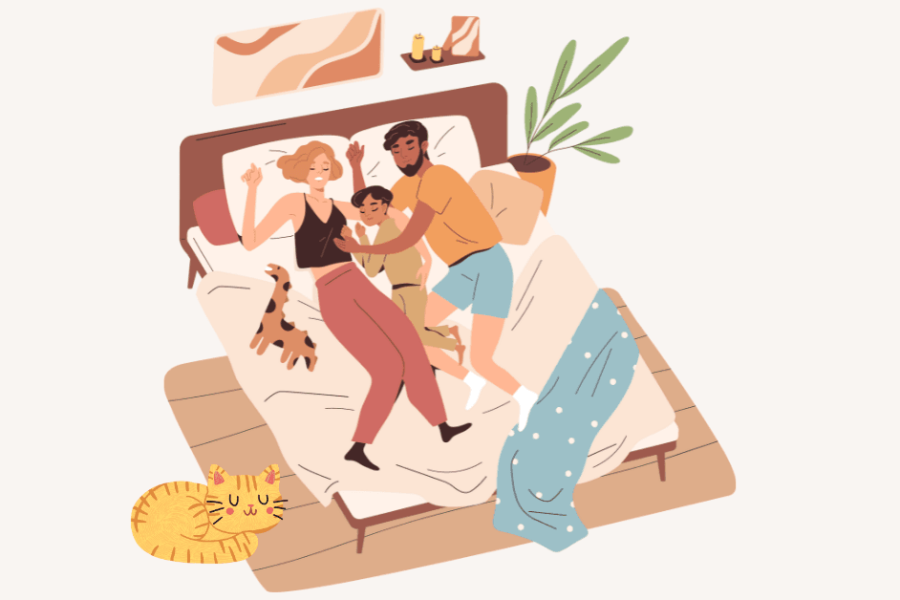One of the most common questions I hear from parents is about co-sleeping and sleep training. Many parents have their baby sleep in their bed, but as babies and toddlers tend to be active sleepers, it often leads to disturbed sleep for everyone (including themselves). This frequent waking prompts parents to seek solutions to help their baby sleep through the night.
Given the strong emotional bond between parents and their children, it’s natural for parents to ask if they can continue co-sleeping while teaching their baby to sleep independently through the night.
The straightforward answer is no, it is not possible. I know for a lot of parents this is hard to hear, but let me go into more details below.

Disrupted sleep:
First and foremost, predicting anyone’s sleep patterns and movements is impossible. Whether it’s you or your partner moving in bed, these actions can require your baby to reposition themselves, often resulting in waking up if they cannot do so comfortably. Depending on the sleep stage, a person can be highly active during sleep.
Inconsistent sleep environment:
Babies and toddlers typically go to bed at a different time than their parents. The simple act of entering the bed can disturb their sleep. Additionally, the mere presence of a parent in bed provides comfort, leading to a strong association with needing that comfort to sleep.
Moreover, adults often use their phones, chat, or read in bed. For a child to sleep soundly, they should be in a quiet, dark room without these distractions.
Safety concerns and the risk of SIDS:
Although SIDS focuses more on the age of 1 years old and below, safety concerns is still a major concern. A parent can still accidentally sleep on top of their baby leading to suffocation or accidental injuries. For this reason, many if not all sleep consultants would not work in these settings. The safest place for your child to be is in their own space.
Mixed signals:
Sleep training requires clear and consistent signals about bedtime routines and sleep expectations. Co-sleeping can send mixed signals to the baby, making it harder for them to understand when it’s time to sleep independently.

The parents will remain the sleep prop:
The primary goal of sleep training is to teach your child to sleep independently. When your child sleeps in your bed, you become their sleep prop, preventing them from learning self-soothing skills. They will continue to rely on your presence to fall asleep, and this dependency can increase as they grow older.
If your child wakes up during the night, it is almost certain they will wake you up to help them fall back asleep whether that involves breastfeeding, bottle-feeding, rocking, tapping, or hugging. It’s natural for a baby to wake up after a sleep cycle, which is why this is almost guaranteed to happen.
As a sleep consultant, this is what I recommend:
Encouraging your baby to sleep independently can be emotionally challenging, similar to ripping off a band-aid. It may be difficult initially, but the long-term benefits are significant. Without taking these steps, you may find that even as your child reaches 8 years old, they will still come to your bed to sleep.
It’s unrealistic to expect your little one to finish their bedtime routine one night and suggest themselves that they will sleep on their own tonight. This will NOT happen. Sleep habits are tough to break, especially for children. The day your child starts sleeping in their own bed, in their own room, will likely be the day you firmly guide them to do so.
By teaching your child independent sleep skills, you are fostering a full night’s rest. They will sleep more soundly, leading to improved mental, physical, and emotional development, as much of the body’s repair and growth occurs during sleep. Think of these changes as crucial for their overall growth and well-being.
Undoubtedly, your baby will experience more consolidated sleep in their own crib compared to sharing a bed with you.
Ready to sleep train your child?
Ready to take the next step towards better sleep? Schedule a free call with me below, and let’s discuss how I can assist you in making this transition.

P.S – if you do have a child up to the age of 7 struggling to sleep independently … we can definitely still fix it!
